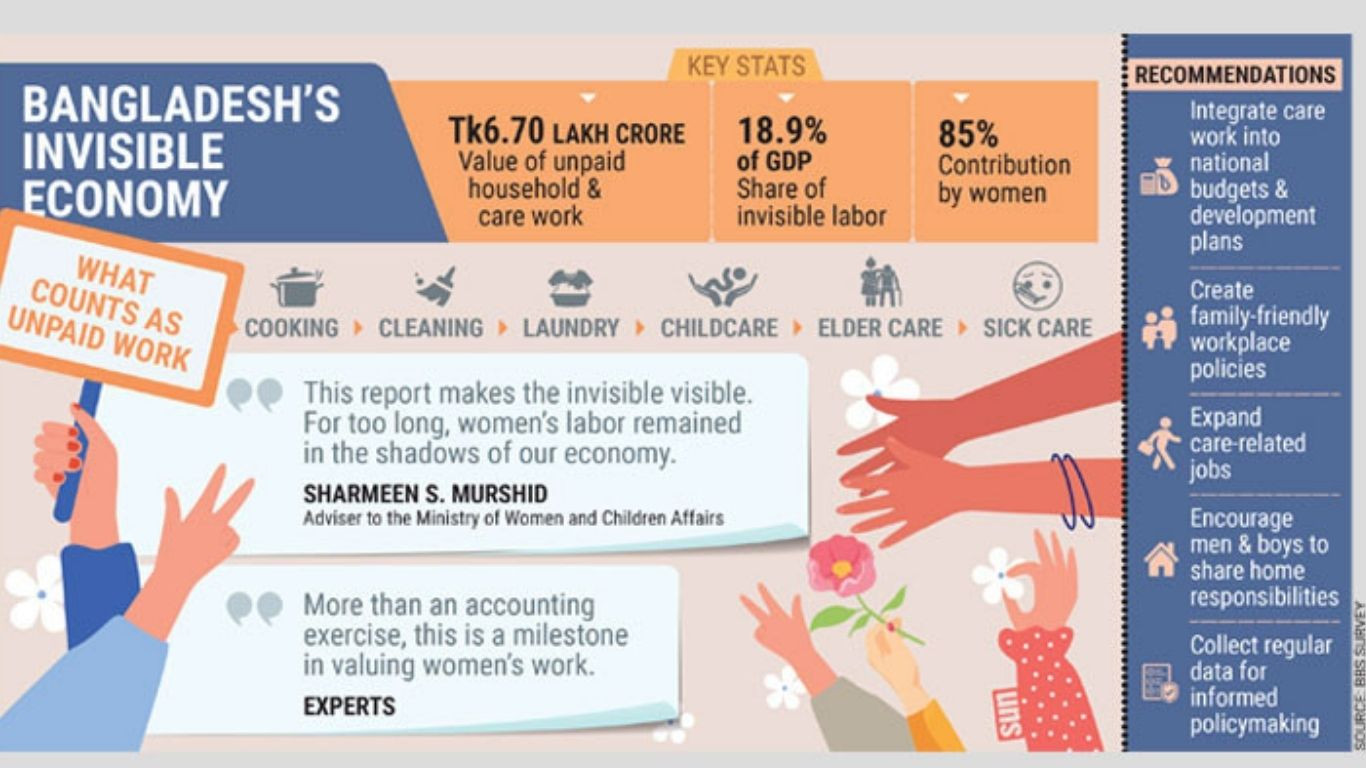Print: 03 Nov 2025
Unpaid household and care work in Bangladesh has been valued at Tk 6.70 lakh crore- equivalent to 18.9% of the country’s GDP in 2021- with women performing 85% of this labor, according to the first-ever official assessment released on Tuesday.
The landmark estimate, presented in the Household Production Satellite Account (HPSA) by the Bangladesh Bureau of Statistics (BBS), underscores the immense but long-overlooked role of women’s unpaid work in sustaining families, communities, and the economy.
Activities such as cooking, cleaning, laundry, childcare, elder care, and caring for the sick traditionally excluded from national accounts have now been formally recognised as economic contributions.
“This report makes the invisible visible. For too long, women’s labour remained in the shadows of our economy. Today, we acknowledge its true value,” said Sharmeen S Murshid, adviser to the Ministry of Women and Children Affairs, who attended the launch as chief guest.
Also present were Momtaz Ahmed, senior secretary of the ministry; Aleya Akter, secretary of the Statistics and Informatics Division; and UN Women Bangladesh Representative Gitanjali Singh, while BBS Director General Mohammad Mizanur Rahman chaired the event.
Presenting the findings, BBS Deputy Director Asma Akhter said the calculation drew on data from the 2021 Time Use Survey and the 2022 Labour Force Survey. UN Women’s Nubayra Jeheen also demonstrated the “Care Calculator” tool, which highlights the time individuals dedicate daily to unpaid tasks.
Policy recommendations
The HPSA report urged the government to integrate care work into budgets and development strategies, create family-friendly workplace policies, expand care-related jobs, and promote shared household responsibilities among men and boys. It also called for regular data collection to support evidence-based policymaking. In a video message, Mahinthan Joseph Mariasingham, chief statistician at the Asian Development Bank, hailed the initiative as a “pioneering step” for Bangladesh.
Why it matters
Experts stressed that recognising unpaid labour is not merely a statistical exercise, but a way to embed gender sensitivity into economic policy and planning. By quantifying women’s “invisible” contribution, Bangladesh is paving the way for more inclusive growth and social equity.
“This is more than an accounting exercise- it is a milestone in valuing women’s work and ensuring it informs policies, budgets, and development priorities,” experts emphasised.
Unpaid household work valued at Tk6.70 lakh crore, Women contribute 85%
Invisible labor accounts for 18.9% of Bangladesh’s GDP-equivalent output, says first-ever official estimate

Unpaid household and care work in Bangladesh has been valued at Tk 6.70 lakh crore- equivalent to 18.9% of the country’s GDP in 2021- with women performing 85% of this labor, according to the first-ever official assessment released on Tuesday.
The landmark estimate, presented in the Household Production Satellite Account (HPSA) by the Bangladesh Bureau of Statistics (BBS), underscores the immense but long-overlooked role of women’s unpaid work in sustaining families, communities, and the economy.
Activities such as cooking, cleaning, laundry, childcare, elder care, and caring for the sick traditionally excluded from national accounts have now been formally recognised as economic contributions.
“This report makes the invisible visible. For too long, women’s labour remained in the shadows of our economy. Today, we acknowledge its true value,” said Sharmeen S Murshid, adviser to the Ministry of Women and Children Affairs, who attended the launch as chief guest.
Also present were Momtaz Ahmed, senior secretary of the ministry; Aleya Akter, secretary of the Statistics and Informatics Division; and UN Women Bangladesh Representative Gitanjali Singh, while BBS Director General Mohammad Mizanur Rahman chaired the event.
Presenting the findings, BBS Deputy Director Asma Akhter said the calculation drew on data from the 2021 Time Use Survey and the 2022 Labour Force Survey. UN Women’s Nubayra Jeheen also demonstrated the “Care Calculator” tool, which highlights the time individuals dedicate daily to unpaid tasks.
Policy recommendations
The HPSA report urged the government to integrate care work into budgets and development strategies, create family-friendly workplace policies, expand care-related jobs, and promote shared household responsibilities among men and boys. It also called for regular data collection to support evidence-based policymaking. In a video message, Mahinthan Joseph Mariasingham, chief statistician at the Asian Development Bank, hailed the initiative as a “pioneering step” for Bangladesh.
Why it matters
Experts stressed that recognising unpaid labour is not merely a statistical exercise, but a way to embed gender sensitivity into economic policy and planning. By quantifying women’s “invisible” contribution, Bangladesh is paving the way for more inclusive growth and social equity.
“This is more than an accounting exercise- it is a milestone in valuing women’s work and ensuring it informs policies, budgets, and development priorities,” experts emphasised.





